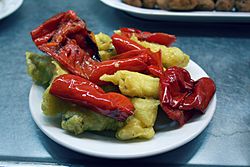Soldaditos de Pavía facts for kids

Soldaditos de Pavía
|
|
| Course | Tapas |
|---|---|
| Place of origin | Spain |
| Region or state | Andalusia, Madrid |
| Serving temperature | Hot |
| Main ingredients | Cod, roasted red pepper |
Soldaditos de Pavía (pronounced Sol-dah-DEE-tohs day Pah-VEE-ah) is a delicious Spanish dish. Its name means "Soldiers of Pavia" in English. This tasty food is made from pieces of cod fish that are fried until crispy. Each piece of cod is often wrapped in a bright red roasted pepper, making it look colorful and appealing.
You can find Soldaditos de Pavía in Andalusian cuisine, which comes from the southern part of Spain. It's also a very popular tapas dish in Madrid, the capital city of Spain.
Contents
What Are Soldaditos de Pavía?
Soldaditos de Pavía are a type of fried fish. The main ingredient is cod, a popular white fish. Before cooking, the cod is often soaked in a special mix. This mix usually includes paprika, which is a spice made from dried peppers, and lemon juice. This marinade gives the fish a lovely flavor.
How They Are Made
To prepare Soldaditos de Pavía, the cod pieces are first marinated. Sometimes, they are briefly put into cold, seasoned water. They are taken out just as the water starts to boil. After this, the cod is ready to be fried until it's golden and crispy. The roasted red pepper is then added, often wrapped around the fish.
A Dish for Celebrations
This dish has been enjoyed for a long time in Spain. A cookbook from 1905, written by Manuel Maria Puga y Parga, mentions that Soldaditos de Pavía were very popular after Easter. This shows that it's a traditional food often eaten during special times.
Why the Name "Soldiers of Pavia"?
The unique name "Soldiers of Pavia" is thought to come from the way the dish looks. Some people believe the orange-red color of the roasted pepper reminds them of the bright uniforms worn by soldiers called Hussars. These soldiers were known for their colorful outfits, especially during the Battle of Pavia. This battle happened a long time ago, in 1525. So, the dish might be named after these soldiers and their distinctive look.
See also
 In Spanish: Soldaditos de Pavía para niños
In Spanish: Soldaditos de Pavía para niños
 | Selma Burke |
 | Pauline Powell Burns |
 | Frederick J. Brown |
 | Robert Blackburn |

